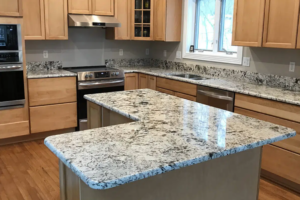Hershey residents are experiencing a renaissance in kitchen renovation as homeowners recognize the transformative power of professional countertop installation. The community’s blend of historic charm and modern lifestyle demands creates unique opportunities for kitchen upgrades that honor traditional design principles yet accommodate contemporary functionality. At Lancaster Kitchens and Baths, we believe that professional countertop installation ensures a precise fit, lasting durability, and seamless integration with existing cabinetry and appliances.
Lancaster Kitchens and Baths provides expert kitchen countertop installation services throughout the Hershey area, delivering comprehensive installation solutions that transform culinary spaces into functional works of art. Our experienced installation teams understand the specific requirements of Hershey homes and provide customized approaches that maximize both aesthetic appeal and practical functionality.
Granite Countertop Installation Excellence
Granite countertops remain the preferred choice for many Hershey homeowners seeking natural beauty combined with exceptional durability. Professional granite installation requires meticulous templating procedures that account for every detail of your kitchen layout, including sink configurations, appliance placement, and cabinet dimensions. Digital templating technology creates precise measurements that eliminate costly installation errors and material waste.
The installation process begins with careful assessment of existing cabinet structures to ensure adequate support for heavy granite slabs. Cabinet reinforcement may be required in older Hershey homes to meet contemporary load requirements. When you choose a premium stone surface upgrade, professional installers utilize specialized equipment for safe handling and precise positioning of granite sections, preventing damage to both the countertop material and surrounding kitchen elements.
Stone fabrication occurs off-site in controlled environments where specialized equipment ensures precise cuts, edge profiles, and hole placements. Professional fabricators account for natural stone variations and plan seam locations to maintain visual continuity across large kitchen layouts. Quality fabrication prevents common installation problems, including uneven surfaces, visible seams, and inadequate support structures.
Quartz Surface Installation Technology
Engineered quartz surfaces offer homeowners consistent patterns and colors that create a uniform appearance throughout kitchen spaces. Quartz installation demands specialized techniques due to the material’s density and engineered composition. Professional fabrication facilities utilize diamond-blade cutting equipment and CNC technology to achieve precise dimensions and complex edge profiles.
Temperature control during installation prevents thermal shock that could cause cracking or discoloration in quartz surfaces. Professional installers monitor ambient temperatures and utilize climate-controlled work environments when necessary. Proper adhesive selection and application techniques ensure permanent bonding between quartz surfaces and cabinet structures.
Quality installation prevents long-term problems, including surface cracking, seam separation, and support structure failure. Professional installers verify cabinet levelness and make adjustments before countertop placement. Kitchen countertops in Lancaster, PA, are the key to a stylish and functional kitchen. They explain how professional installation techniques maximize both appearance and longevity.

Butcher Block Installation Procedures
Wood countertops bring natural warmth and character to Hershey kitchen designs, particularly in homes with traditional or farmhouse aesthetic preferences. Butcher block installation requires specialized techniques to accommodate wood’s natural expansion and contraction properties. Professional installers select appropriate wood species and grain orientations that minimize movement and cracking over time.
Moisture management becomes critical in butcher block installations to prevent warping, splitting, and bacterial growth. Professional installation includes proper sealing procedures and ventilation considerations that maintain wood stability. Edge grain and end grain orientations require different installation approaches and maintenance schedules.
Professional installers coordinate butcher block installation with plumbing and electrical work to prevent water damage and ensure proper functionality. Sink cutouts require waterproof sealing to prevent moisture penetration that could compromise wood integrity. Regular maintenance schedules help homeowners preserve the natural beauty and functionality of wood countertops.
Marble Countertop Installation Expertise
Marble countertops create luxurious kitchen environments that appeal to homeowners seeking elegant, high-end aesthetics. Natural marble requires careful handling and installation techniques due to its susceptibility to etching, staining, and thermal shock. Professional countertop installers utilize specialized equipment and protective measures throughout the installation process.
Structural assessment becomes particularly important for marble installations due to the material’s substantial weight and brittleness. Cabinet reinforcement and proper support distribution prevent stress concentrations that could cause cracking. Professional installers account for marble’s natural variations and plan installations that showcase the stone’s unique characteristics.
Sealing procedures require specialized products and application techniques specific to natural stone properties. Professional installers provide comprehensive care instructions and maintenance schedules that preserve marble’s appearance and functionality. Proper installation techniques maximize marble’s lifespan and minimize common problems, including etching, staining, and structural damage.
Installation Planning and Preparation
Successful kitchen countertop installation projects begin with comprehensive planning that addresses structural, mechanical, and aesthetic considerations. Professional installers conduct thorough site assessments that identify potential challenges and develop solutions before installation begins. Plumbing and electrical coordination ensures proper functionality and code compliance.
Kitchen layout analysis determines optimal seam placement, support requirements, and installation sequencing. Appliance integration requires precise measurements and coordination with mechanical systems. Professional planning prevents costly delays and modifications during installation procedures.
Material ordering and scheduling coordination ensure project completion within established timelines. Professional installers maintain relationships with suppliers and fabricators that guarantee quality materials and reliable delivery schedules. Project management expertise minimizes disruption to daily household routines during installation.
Cabinet Assessment and Reinforcement
Existing cabinet condition directly impacts countertop installation success and long-term performance. Professional installers conduct comprehensive cabinet assessments that evaluate structural integrity, levelness, and support capacity. Older Hershey homes may require cabinet modifications or reinforcement to meet contemporary standards.
Leveling procedures ensure even countertop installation and prevent stress concentrations that could cause cracking. Professional installers utilize precision leveling equipment and make necessary adjustments to cabinet structures. Proper leveling prevents common problems, including uneven surfaces, door alignment issues, and premature wear.
Support structure reinforcement may be required for heavy countertop materials, including granite and marble. Professional installers add blocking, brackets, or cabinet modifications that distribute weight evenly and prevent structural failure. Proper reinforcement extends countertop lifespan and maintains warranty coverage.
Plumbing Integration and Coordination
Kitchen countertop installations require careful coordination with plumbing systems to ensure proper functionality and prevent water damage. Professional installers work closely with licensed plumbers to coordinate sink installations, faucet placements, and supply line connections. Proper coordination prevents costly rework and installation delays.
Sink cutout procedures require precision cutting and sealing to prevent water infiltration and structural damage. Professional installers utilize templates and measuring systems that ensure a perfect fit and proper functionality. Undermount sink installations require specialized techniques and support structures that maintain long-term integrity.
Garbage disposal integration requires coordination between countertop fabrication and plumbing installation. Professional installers account for disposal dimensions and clearance requirements during planning phases. Proper integration prevents interference problems and ensures reliable operation.

Electrical System Coordination
Modern kitchen countertop installations often require electrical modifications for lighting, outlets, and appliance connections. Professional installers coordinate with licensed electricians to ensure code compliance and optimal functionality. Under-cabinet lighting integration requires planning during countertop installation phases.
Outlet placement and GFCI requirements must be addressed during countertop installation to prevent code violations and safety hazards. Professional installers work with electrical contractors to ensure proper clearances and accessibility. Island and peninsula installations may require additional electrical planning and coordination.
Appliance electrical connections require coordination between countertop installation and electrical work. Professional installers ensure adequate clearances and access for electrical connections. Proper coordination prevents delays and ensures reliable appliance operation.
Quality Control and Inspection Procedures
Professional countertop installation includes comprehensive quality control procedures that verify proper fit, finish, and functionality. Installers conduct detailed inspections at multiple project phases to identify and address potential problems before completion. Quality control prevents costly callbacks and ensures customer satisfaction.
Seam quality assessment verifies proper alignment, adhesion, and finishing. Professional installers utilize precision measuring equipment and visual inspection techniques that identify potential problems. Proper seam construction prevents separation and maintains aesthetic appeal over time.
Surface inspection procedures identify scratches, chips, or other damage that could compromise appearance or functionality. Professional installers address surface imperfections before project completion and provide touch-up services when necessary. How to pick the perfect kitchen countertop guides homeowners through quality considerations that impact long-term satisfaction.
Edge Profile Options and Finishing
Countertop edge profiles significantly impact both aesthetic appeal and functionality of installed surfaces. Professional fabricators offer numerous edge options, including bullnose, beveled, ogee, and custom profiles that complement kitchen design themes. Edge selection affects both appearance and maintenance requirements.
Polished edges provide smooth, easy-to-clean surfaces that work well in contemporary kitchen designs. Honed or textured edges offer slip resistance and hide fingerprints more effectively than polished surfaces. Professional installers help homeowners select edge profiles that match their lifestyle and maintenance preferences.
Custom edge profiles enable unique design elements that distinguish kitchen installations. Professional fabricators utilize CNC equipment and hand-finishing techniques that create distinctive edge treatments. Custom edges may require additional fabrication time and cost considerations.
Installation Timeline and Project Management
Professional countertop installations follow established timelines that coordinate with other kitchen renovation activities. Typical installation projects require 2-3 weeks from initial measurement to final installation, depending on material selection and project complexity. Professional project management ensures timely completion and minimizes household disruption.
Fabrication timing varies by material type and complexity, with natural stone requiring additional processing time for template creation and custom cutting. Engineered materials typically offer shorter fabrication schedules due to standardized processing procedures. Professional installers provide realistic timelines and regular progress updates.
Installation scheduling coordinates with other trades, including plumbers, electricians, and flooring contractors. Professional project management ensures proper sequencing and prevents conflicts between different installation activities. Proper scheduling minimizes delays and ensures quality results.
Post-Installation Care and Maintenance
Professional countertop installation includes comprehensive care instructions and maintenance recommendations specific to installed materials. Different countertop materials require unique care procedures to maintain appearance and functionality over time. Professional guidance helps homeowners develop maintenance routines that preserve their investment.
Sealing schedules vary by material type, with natural stone requiring annual or bi-annual sealing applications. Professional installers provide sealing products and application instructions that ensure proper maintenance. Regular sealing prevents staining and maintains surface integrity.
Cleaning product recommendations help homeowners avoid damage from inappropriate cleaning chemicals. Professional installers provide approved cleaning products and techniques that maintain surface appearance without causing etching or discoloration. Proper care extends countertop lifespan and maintains warranty coverage.
Warranty Coverage and Service Support
Professional countertop installation includes comprehensive warranty coverage that protects both materials and installation workmanship. Warranty terms vary by material type and installation complexity, with most installations including multi-year coverage against defects and installation problems. Professional installers honor warranty commitments and provide prompt service response.
Service support includes routine maintenance assistance and repair services when needed. Professional installers maintain relationships with material suppliers and can provide replacement materials that match original installations. Ongoing support ensures long-term customer satisfaction and countertop performance.
Documentation provided at installation completion includes warranty information, care instructions, and service contact information. Professional installers maintain project records that support warranty claims and future service needs. Proper documentation protects homeowner investments and ensures continued support.
Ready to transform your Hershey kitchen with professional countertop installation? Contact Lancaster Kitchens and Baths today to schedule your consultation and discover how expert installation can enhance both the beauty and functionality of your culinary space.
Industry Standards and Compliance Resources
Kitchen countertop installations must comply with local building codes and safety standards. The International Code Council (ICC) provides comprehensive building code standards that govern structural requirements and safety considerations for kitchen renovations. These codes ensure proper installation practices and homeowner safety.
The Consumer Product Safety Commission (CPSC) establishes safety standards for kitchen materials and installation practices that protect homeowners from potential hazards. CPSC guidelines address material safety, installation procedures, and maintenance requirements that ensure long-term safety and performance.
Frequently Asked Questions
What factors determine the timeline for kitchen countertop installation in Hershey homes?
Kitchen countertop installation timelines depend on several factors, including material selection, fabrication complexity, and coordination with other renovation activities. Natural stone materials, including granite and marble, typically require 2-3 weeks from initial templating to final installation due to custom fabrication requirements. Engineered materials like quartz often have shorter lead times of 1-2 weeks, depending on supplier availability and pattern selection. Project complexity affects timeline, with simple straight runs installing faster than layouts requiring multiple seams, cutouts, or special edge profiles. Coordination with plumbing and electrical work may extendthe overall project duration, but ensures proper integration of all kitchen systems. Professional installers provide realistic timelines during initial consultations and maintain communication throughout the project to manage expectations and prevent delays.
How do I prepare my Hershey kitchen for professional countertop installation?
Kitchen preparation for countertop installation requires coordination with installation teams and temporary adjustments to daily routines. Remove all items from existing countertops and cabinet surfaces to provide clear access for installation crews. Disconnect and remove small appliances, and coordinate with installers regarding larger appliances that may require temporary disconnection. Clear pathways through your home to allow safe material transport and equipment access. Plan alternative meal preparation arrangements during installation periods, as kitchen functionality will be temporarily limited. Protect adjacent areas, including floors and walls, with appropriate coverings to prevent damage during installation. Communicate with family members about installation schedules and access requirements. Professional installers provide specific preparation checklists during pre-installation consultations to ensure smooth project execution and minimal household disruption.
What countertop materials work best for Hershey’s climate and lifestyle demands?
Hershey’s moderate climate with seasonal temperature variations requires countertop materials that handle thermal cycling and humidity changes effectively. Granite countertops perform excellently in Pennsylvania’s climate due to their natural resistance to temperature fluctuations and low moisture absorption rates. Quartz surfaces offer superior consistency and require minimal maintenance while withstanding temperature variations without cracking or discoloration. Butcher block requires additional care in humid conditions, but provides natural warmth and character that complements traditional Hershey home styles. Marble offers luxury appeal but requires regular maintenance and sealing to prevent damage from temperature and humidity changes. Material selection should consider your cooking habits, maintenance preferences, and aesthetic goals. Professional consultations help homeowners evaluate climate factors and lifestyle requirements to select optimal countertop materials for long-term satisfaction and performance.
How do professional installers ensure proper support for heavy countertop materials?
Professional countertop installation includes comprehensive cabinet assessment and reinforcement procedures to support heavy materials safely and permanently. Installers evaluate existing cabinet construction, checking for adequate frame strength, proper fastening, and level installation that distributes weight evenly. Granite and marble installations often require additional support, blocking, or brackets that transfer weight to cabinet frames and wall structures. Engineered support systems may include steel brackets, plywood reinforcement, or additional cabinet modification to meet manufacturer specifications. Professional installers use precision leveling equipment to ensure even weight distribution and prevent stress concentrations that could cause cracking. Support requirements vary by material type, span length, and cabinet construction, with older homes sometimes requiring more extensive reinforcement than newer construction. Proper support installation maintains warranty coverage and ensures long-term performance without sagging, cracking, or structural failure.
What maintenance requirements should Hershey homeowners expect after countertop installation?
Countertop maintenance requirements vary significantly by material type and finish, with professional installers providing specific care instructions tailored to installed surfaces. Granite countertops require annual sealing applications using penetrating sealers that prevent staining and bacterial growth. Daily cleaning involves mild soap and water with periodic deep cleaning using stone-specific products that maintain polish and prevent etching. Quartz surfaces require minimal maintenance with regular cleaning using non-abrasive cleaners and immediate cleanup of spills to prevent staining. Butcher block requires monthly oil treatments and annual refinishing to maintain water resistance and prevent bacterial growth. Marble demands immediate spill cleanup and regular sealing to prevent etching from acidic substances. Professional maintenance includes periodic inspection, resealing when necessary, and minor repair services. Proper maintenance extends countertop lifespan, maintains appearance, and preserves warranty coverage while ensuring continued safety and functionality.






